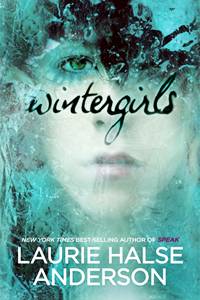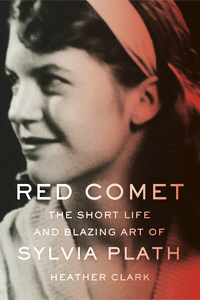Title Wintergirls
Author Laurie Halse Anderson
Published March 19th, 2009 by Viking Juvenile
Pages 278 Pages
Intended Target Audience Young Adult
Genre & Keywords Contemporary, Realistic Fiction, Eating Disorders, Mental Illness
Part of a Series? No
Source & Format Purchased from Chapters, Paperback
Find It On Goodreads ● Amazon.com ● Chapters
Synopsis
Lia and Cassie are best friends, wintergirls frozen in matchstick bodies, competitors in a deadly contest to see who can be the skinniest. But what comes after size zero and size double-zero? When Cassie succumbs to the demons within, Lia feels she is being haunted by her friend’s restless spirit.
In her most emotionally wrenching, lyrically written book since the multiple-award-winning Speak, Laurie Halse Anderson explores Lia’s descent into the powerful vortex of anorexia, and her painful path toward recovery.
“So she tells me, the words dribbling out with the cranberry muffin crumbs, commas dunked in her coffee.
She tells me in four sentences. No, five.
I can’t let me hear this, but it’s too late. The facts sneak in and stab me…
It’s not nice when girls die.”
Former best friends Lia and Cassie are ‘Wintergirls’, engaged in a potentially fatal competition to determine who can become the skinniest. Suffering from anorexia and bulimia respectively, Lia and Cassie are slowly deteriorating at the hands of their respective eating disorders. Enmeshed in an increasingly toxic relationship, the two girls are finally estranged after Cassie emerges from treatment for what will prove the final time.
“Here stands a girl clutching a knife. There is grease on the stove, blood in the air, and angry words piled in corners. We are trained not to see it, not to see any of it.
…body found in a motel room, alone…
Someone just ripped off my eyelids.”
Laurie Halse Anderson’s Wintergirls begins as eighteen-year-old Lia receives devastating news about the untimely death of her former best friend, Cassandra ‘Cassie’ Jane Parrish. Having not spoken to Cassie in months, the news comes as something of a shock. All Lia knows is that the night she was found dead, Cassie had continually called Lia’s cellphone, all of which went unanswered. When Lia finally works up the courage to check her messages, what she finds are thirty-three voicemails from Cassie, each one increasingly desperate and garbled in the hours leading up to her death. Having never returned the calls, Lia is left to wonder what may have happened had she been more receptive to Cassie’s obvious cries for help.
“You’re not dead, but you’re not alive, either. You’re a wintergirl, Lia-Lia, caught in between the worlds. You’re a ghost with a beating heart. Soon you’ll cross the border and be with me.”
Haunted by Cassie’s ghost and consumed by her grief and guilt for her perceived role in Cassie’s death, Lia’s anorexia continues to worsen. Although she assures everyone that she has come to terms with Cassie’s death and is on the road to recovery, it quickly becomes clear that this is anything but the truth. Spinning a web of deception in order to disguise the escalating severity of her anorexia, Lia’s eating disorder and self-destructive behaviour spirals increasingly out of control. Interspersed with recollections of her time with Cassie as well as her past admittance into treatment centers, Wintergirls is a deeply moving psychological study of one girl’s descent into darkness and the clutches of a disorder that she is either unwilling, or unable, to escape from.
“I won’t pollute my insides with Bluberridazzlepops or muffins or scitchyscratchy shards of toast, either. Yesterday’s dirt and mistakes have moved thorough me. I am shiny and pink inside, clean. Empty is good. Empty is strong.”
Ordinarily, I try to remain as impartial as I can when reviewing a book, weighing my own personal enjoyment against other considerations such as plot, character development, originality, etc. In this case, however, I think my personal history colours my opinion of the book in question and I thought a brief, honest disclosure on my part might explain why I was so deeply moved by this novel. I’ve struggled with disordered eating for as long as I can remember. It distorts and perverts my relationship with food as well as with my own body. There isn’t an aspect of my life that this doesn’t affect in some way, no matter how infinitesimal it might seem. This is particularly true in times of stress, when it allows me the perception of control when I might otherwise feel powerless or overwhelmed. In recent years I’ve taken steps to correct this – I no longer weigh myself so I can’t focus on the numbers on the scale. I try to view food as nourishment as opposed to the ‘enemy’ or something I have to earn. I try to be as self-aware as I can regarding how dangerous and toxic my thoughts once were and make a conscious effort to correct them. It’s something I struggle with every day and I doubt I will ever have an entirely ‘normal’ or ‘healthy’ relationship with food. While this personal connection to the issues discussed within the text might very well have contributed to my admiration of this novel, I would argue that it is a phenomenal, thought-provoking and eminently moving tale, regardless of whether or not you have any personal experience with the subject matter.
“We held hands when we walked down the gingerbread path into the forest, blood dripping from our fingers. We danced with witches and kissed monsters. We turned us into wintergirls, and when she tried to leave, I pulled her back into the snow because I was afraid to be alone.”
Having spent a number of years in and out of treatment, Lia has learned how to manipulate the system to her advantage. She knows precisely what to say and do in order to be released from the programs she had been forcibly admitted into, and continues to manipulate those around her after her release in order to conceal the true depth and severity of her disorder. The reader can only watch as she guzzles water before a weigh-in and sews quarters into the pockets of her robe, all in the hope of distorting the numbers that dictate every waking moment of her life. Her desperation to hold onto something that is quite obviously destroying her life is simultaneously maddening, heart-breaking and undeniably evocative, showing the lengths people will go in order to continue something that is quite literally killing them.
“I bit, chewed, swallowed day after day and lied, lied, lied. (Who wants to recover? It took me years to get that tiny. I wasn’t sick; I was strong.) But staying strong would keep me locked up. The only way out was to shove in food until I waddled.”
It quickly becomes clear that Lia does not have a positive relationship with either parent, choosing to refer to them as ‘Dr. Marrigan’ and Professor Overbrook’ as opposed to ‘mom’ and ‘dad’. It was difficult to watch as Lia continually held them at bay, perceiving their attempts to intervene on her behalf as a threat to the only stable, reliable thing in her life. Wintergirls deftly portrays the affect that anorexia has, not only on the individual suffering from the disorder, but also on the surrounding family nucleus and those that care most about them. The effect of Lia’s anorexia, both for herself and those around her, was as far-reaching as it was devastating.
“089.00.
I could say I’m excited, but that would be a lie. The number doesn’t matter. If I got down to 070.00, I’d want 065.00. If I weighed 010.00, I wouldn’t be happy until I got down to 005.00. The only number that would ever be enough is 0. Zero pounds, zero life, size zero, double-zero, zero point. Zero in tennis is love. I finally get it.”
I’ve seen a number of complaints that Lia is not a traditionally ‘likable’ or ‘relatable’ character and that she is difficult to sympathize with. While I was able to relate to and care about her in a way that is rather unparalleled for me, I can recognize rationally why this might not be the case for everyone. Lia can be selfish, self-destructive and secretive, all of which I would argue are traits that are a direct result of her eating disorder as they necessitate her behaviour. Laurie Halse Anderson is fearless, taking us on a journey with a character that few authors would dare to explore. Lia is certainly not your ordinary young adult protagonist – She is not stunning beautiful yet charmingly unaware of her appeal. She is not adorably clumsy. She is not necessarily nice or presented as the ‘every woman’ to which we can all relate. In short, Lia is not a blank slate onto which you can project your own personality or expectations. Anderson, quite rightly, makes no apologies or justifications for Lia’s behaviour. Lia is dark and damaged, presented to us blemishes and all. But I don’t believe that any of this should really matter. I would argue that you don’t have to like Lia personally to sympathize with her plight. Lia is quite obviously sick, incapable of making the healthy or ‘right’ choices for herself. Her gradual mental and physical deterioration felt honest and authentic without being exploitive. This was easily one of the most sensitive and nuanced portrayals of mental illness I’ve read in recent memory.
“She wants to ruin my life,” I explain.
“What a bitch. It’s like she thinks she’s your mother or something.”
“She’s a psychopath,” I said. “It’s complicated.”
“Psychopaths can’t afford fur coats.”
Wintergirls is also underscored by a secondary storyline involving the rather unusual friendship that Lia forms with Elijah. An intermittent vegetarian, armchair philosopher and former bike messenger turned handyman, Elijah lives and works at the Gateway Motel, the scene of Cassie’s death. Having spoken with Cassie prior to her death and been the one unfortunate enough to discover her body, Elijah had been tasked with giving Lia a message from Cassie. He soon becomes increasingly ingratiated in Lia’s life as he acts as a port in the storm and provides the occasional shoulder to lean on. I don’t want to mislead anyone – There is no romantic subplot in Wintergirls. Given the points at which the two characters are in their respective lives, I wouldn’t have expected, or wanted, anything more than what we’re given. Anything else would have felt forced or insincere. What results instead is a sweet friendship between two people simply trying to find their respective places in the world.
“My hands read a Braille map hewn from bone, starting with my hollow breasts threaded into blue-vein rivers thick with ice. I count my ribs like rosary beads, muttering incantations, fingers curling under the bony cage. They can almost touch what’s hiding inside.”
Prospective readers should be made aware that this is almost entirely a character-driven novel. Wintergirls is simultaneously vast and minute in its scope in that we are treated to one specific case study, but that in retrospect is indicative of a much larger societal problem. The novel can often feel claustrophobic as the entirety of the story is spent inside Lia’s head as we are treated to an unflinching, unapologetic glimpse into the mind of a character suffering from a severe eating disorder. Those looking for a light-hearted contemporary romp or an action-packed story should look elsewhere. Wintergirls is a slow, methodical examination of trauma and the aftermath of Lia’s grief in the days immediately following Cassie’s death.
“I am the space between my thighs, daylight shining through.
I am the library aide who hides in Fantasy.
I am the circus freak encased in beeswax.
I am the bones they want, wired on a porcelain frame.”
There are books that come around very rarely, ones that touch our lives in unimaginable ways and leave indelible marks on our souls. They are so beautifully written that they inspire and awe, leaving you breathless with a twisted combination of envy and admiration. Wintergirls is undeniably one such story. Reminiscent of the work of some of my favourite authors including Sylvia Plath, Margaret Atwood and Chuck Palahniuk, Wintergirls reads like a brilliant literary masterpiece while still managing to be accessible and thought-provoking. Where Fever 1793 was gentle and poetic, Wintergirls is brash and fearless, employing daring stylistic choices that challenge the reader and prove that there are no rules when it comes to great writing. Punctuated by a series of sharp, staccato sentences, broken thoughts and whimsical made-up words, Anderson’s breath-taking writing perfectly conveyed Lia’s conflicted feelings about her disorder, as well as her confusion and delirium as she increasingly restricts her food and water intake. While the techniques Anderson employs might have seemed gimmicky or unnecessary in the hands of a less skilled writer, in this case they perfectly compliment the haunting, dreamy feeling that permeates the text. Like peering through the convex glass of a fishbowl, the narrative is distorted. Haunting and melodic, Wintergirls provides the reader with only one side of the story, as they are privy only to the thoughts of an unreliable, and increasingly ill and delirious, narrator.
“I breathe in slowly. Food is life. I exhale, take another breath. Food is life. And that’s the problem. When you’re alive, people can hurt you. It’s easier to crawl into a bone cage or a snowdrift of confusion. It’s easier to lock everybody out.
But it’s a lie.”
In her now-recognizable trademark unflinching, unapologetic and beautifully lyrical voice, Anderson removes the stigma surrounding mental illness and bravely shines a light on a serious disorder that affects millions of men and women every year. With Wintergirls, Laurie Halse Anderson has done more than simply pen an eminently enthralling story about one girl’s struggle with anorexia. Rather, she has crafted a tale that holds the potential to change lives, one that will no doubt touch an innumerable number of people. I know it certainly has in mine. In addition to giving a voice to those that feel they cannot speak, most importantly of all, Anderson undeniably provides us with hope – Hope that there is light at the end of the tunnel and that recovery is possible, even for those who seem irreparably lost. This is one novel that should be a staple on required and voluntary reading lists alike, and should be pressed into the hands of every young adult struggling to find some sense of stability during a period in their lives that is typified by uncertainty and change. Wintergirls is not to be missed under any circumstance.
Caution: This novel contains themes that might not be suitable for younger readers. Frank discussions of eating disorders and self harm are described in detail. Wintergirls may prove triggering for those who suffer from these or similar issues.

Overall Rating


Around The Web
Still not sure this is the right book for you? Why not listen to what some other bloggers had to say about it?
● Amanda @ Late Nights With Good Books wrote “Raw and emotionally wrenching, Wintergirls was an incredibly difficult read for me. It’s not something I can ever imagine re-reading. But, really, I don’t think that I’d want a book with this subject matter to be written any other way. It is an important and thought-provoking read that I think should be required reading for teen girls and those past that age who may need help remembering how difficult the teenage years can be.” (Read the rest of the review Here!)
● Renae @ Respiring Thoughts wrote “It wasn’t a bad book by any means — I actually thought it was quite good and I enjoyed it a lot. But Wintergirls definitely didn’t live up to the hype that accompanies it.” (Read the rest of the review Here!)
● Alexa @ Alexa Loves Books wrote “It was a hard book to read – but it was well worth my effort. With a powerful story filled with potent emotions and a subject matter that would normally be taboo, Wintergirls certainly shed some light on this sensitive topic with a story that packed a punch to the gut.” (Read the rest of the review Here!)












17 Responses
Wow, this one sounds pretty good. The cover is to die for.
Jennifer Bielman recently posted…Kindle & Nook Freebies #45
It’s an absolutely perfect story 🙂 I hope you have the opportunity to read it one day as I would love to hear your thoughts on it.
Jen @ Pop! Goes The Reader recently posted…Review: Wintergirls by Laurie Halse Anderson
I read this last year, and it was a hard book to read – but I’m glad I did. Laurie Halse Anderson certainly picks the tough topics to write about, but when she does she doesn’t sugar coat them. I like that.
Mandi Kaye recently posted…Review: The Story Guy by Mary Ann Rivers [novella]
I completely agree 🙂 While it’s certainly not something I could re-read often, it’s such a moving, powerful story and, like you, I respect that Anderson never fails to examine these tough topics in an entirely realistic and unflinching way.
P.S. I just have to say how much I adore your blog. It’s absolutely stunning and I love how thoughtful and insightful your reviews are 😀 Thanks for taking the time to comment!
Jen @ Pop! Goes The Reader recently posted…Review: Wintergirls by Laurie Halse Anderson
Thank you! That’s exactly how I feel about your blog! I’m so glad you started it.
I listened to the audio of Wintergirls and remember it being very intense. The Lia character struck a chord with me as well. It felt so real that the book was an uncomfortable reading experience.
I’ve only read Wintergirls and Speak by this author but you make me want to try out Fever 1793 as well. Gorgeous review!
Lucy recently posted…Dirty Little Secret by Jennifer Echols Book Review
Thank you so much, Lucy! 🙂 I’m so glad to hear that you enjoyed it as well. It certainly isn’t the sort of story that you can re-read over and over again, but I don’t think you need to. I know that Wintergirls will stick with me for years to come.
My review for Fever 1793 can be found Here, in case you were interested in learning a little more about it 😀 I love historical fiction in general, and thought it was an absolutely beautiful story. Very gentle and sweet, despite the subject matter.
Jen @ Pop! Goes The Reader recently posted…Review: Wintergirls by Laurie Halse Anderson
I always love reading your reviews, I wish I could write one that long and informational. I think I also gave this one a high rating, and I agree that it deals with these real issues quite well.
Alise @ Readers In Wonderland
Wow, thank you so much Alise! I was really touched by your kind comment 😀
Sometimes I worry that my reviews are overly verbose as I’ve always had a problem with that. Why say something in two words that can be said in twenty? 😉 It’s nice to see that some people are enjoying reading them!
Jen @ Pop! Goes The Reader recently posted…Review: Wintergirls by Laurie Halse Anderson
This is a really beautiful review. I have to admit, stories that deal with weighty issues such as eating disorders never instantly appeal to me. I guess as I am an escapist reader, I’d rather lose myself in a book that isn’t as draining or intense. Having said that, I do occasionally find myself picking up the odd hard-hitting realistic read, and I’ll definitely keep this in mind for later (when I’m in the right mood). I’m glad you were able to connect with it on a personal level, Jen. Lovely review!
Sam @ Realm of Fiction recently posted…Review: Crown of Midnight by Sarah J. Maas
Thank you so much, Sam 🙂 I can only hope that I was able to convey at least a little of what this book meant to me and how much it touched me personally.
I completely understand your desire to read predominately for pleasure (I often find myself doing the same!), and Wintergirls is certainly not an easy read by any stretch of the imagination. That said, if you’re ever in the mood for more serious fare, I would highly recommend it. I don’t often find myself reading ‘issue’ books either, but when I do I always know I can count on Laurie Halse Anderson to examine them in a realistic and authentic way.
Jen @ Pop! Goes The Reader recently posted…Review: Wintergirls by Laurie Halse Anderson
The reason I picked this novel up a couple years ago was because of my own struggle with various eating disorders throughout my teens and now into my 20s. While I’ve read probably every teen book about EDs, this one spoke to me in a way that few others could, and I think that is because of the character Anderson created in Lia. Anderson took away the dainty ballerina stereotype of a girl who suffers from anorexia (or bulimia, etc) and finally gave her a face, with a real personality, a real back story, and real trauma to recover from. I understand that Lia is probably abrasive to most people, but she’s the real reason Wintergirls spoke to me.
From a technical standpoint, all I can say that Anderson has humbled me and given me a huge dose of writer-envy with her prose. I love authors that try new things with their writing style and their narrative so the writing really excited me while reading Wintergirls.
Anyway, thank you for sharing your story, Jen, and thank you for a wonderful review of this amazing book.
Bekka @ Pretty Deadly Reviews recently posted…Review: Dangerous Girls
Thank you so much for commenting, Bekka! I really appreciate your willingness to share some of your story as well. I know how difficult that can be.
I’m so glad that Wintergirls left as much as an impression on you as it did on me. I have read quite a few books, both fiction and non-fiction, on the subject of eating disorders over the years and Wintergirls is easily one of the finest and most powerful of the group. I was saddened to read quite a few of the lower ratings on Goodreads, particularly those that denigrated Lia, as my heart absolutely broke for her. I just hope that my review was able to do justice to such a beautifully-written story. It certainly had a lot to live up to!
Jen @ Pop! Goes The Reader recently posted…Review: Sisters Red by Jackson Pearce
Great review, Jen. Books about eating disorders are really important, and I think it’s good that there is a novel about it, too, not only factual books.
I’ll be adding it to my TBR 🙂
Lexxie @ (un)Conventional Bookviews recently posted…Blogtour: Giveaway + Review One Wicked Night – Emily Quinn
I can’t wait to hear what you thought about it, Lexxie 🙂 I really hope you enjoy it!
Jen @ Pop! Goes The Reader recently posted…Review: Sisters Red by Jackson Pearce
This is a great review Jen! This was actually my second book i read back in 2011 (Thirteen Reason Why by Jay Asher was my first) and I actually purchased it because of my own struggles with food in the past.
It’s been almost 2 years since I read this book but I remember quite clearly how intense the story was and admittedly was hooked from the first page, I’m so happy to see this book finally making its rounds.
Georgina Robinson recently posted…TOP 10 TUESDAY: N’9
I’m so happy to hear that you enjoyed it too, Georgina! 🙂 It’s very clear that this is the sort of book that makes a really distinct impression on its readers. I know I certainly won’t forget it any time soon!
Jen @ Pop! Goes The Reader recently posted…Top Ten Authors Who Deserve More Recognition